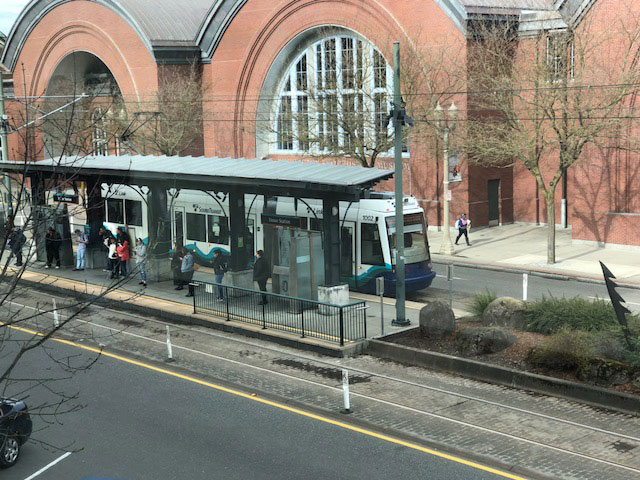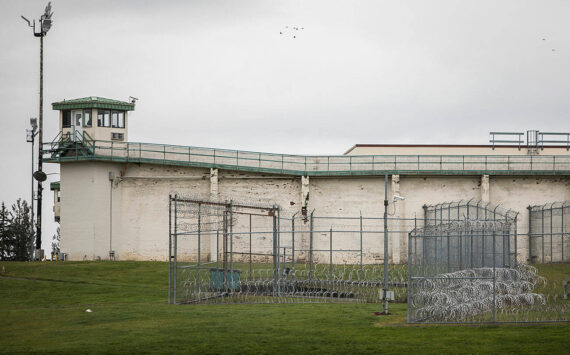By Morf Morford
Tacoma Daily Index
It might seem like the craziest idea ever (and we are certainly in a season of crazy – and ever crazier – ideas) but free transit?
Allow me to dispense with the obvious argument that nothing is free. Yes, nothing is “free” especially something that requires fuel and constant maintenance and that is the easy part; construction, easements, right-of-ways and property purchases are absurdly expensive – and will be even more expensive in the future.
Even something as low maintenance and small, like a bike lane, costs about a million dollars a mile – unless it runs into a demented whirlwind of unexpected expenses (as recently happened in Seattle) where a bike lane (six-feet wide) hyper-exploded into 12 million dollars for each mile (https://www.seattletimes.com/seattle-news/transportation/12-million-a-mile-heres-how-bike-lane-costs-shot-sky-high-in-seattle/).


The point is not whether any given program or system is the cheapest or the safest – the real issue is whether it is cheaper or safer than the alternative.
There are other ways to charge for passage than standard fares – or even some kind of charge card.
Some cities even encourage people to recycle (and save money) by using plastic bottles to pay or even set up an account to use later. (1*)
Some places even offer the option of doing exercise to “earn” subway fare (Mexico and Russia – https://www.theguardian.com/society/shortcuts/2015/jan/27/mexico-beat-obesity-make-commuters-do-squats-for-free-subway-tickets and https://www.reddit.com/r/ANormalDayInRussia/comments/7uj212/moscow_subway_ticket_machine_accepts_30_squats_as/).
Other countries, geographically smaller than the USA, (like Japan, Germany, Denmark and many others) have vastly more sophisticated mass transit systems.
And most of them are doing their best to get a high percentage of drivers out of their cars (and clogged streets) and onto public urban transit.
Some entire countries (like Luxembourg) are even experimenting with free transit (https://qz.com/1488212/luxembourg-is-the-first-county-to-make-all-public-transit-free/).
Here are a few numbers to give a sense of the scale of our current transportation system. We have approximately:
4.12 million miles of roads, (not counting interstate highways)
608,445 bridges
5,145 public-use airports, 13,863 private airports that serve recreational and business air travel and 286 military airports.
138,565 miles of railroad track that carries much of the nation’s heavy freight and agricultural output. This includes track operated by the nation’s Class 1 freight railroads, regional freight railroads and local freight railroads. Amtrak operates 21,225 miles of passenger rail service in the U.S., much of it over track owned by the freight railroads.
Over 271,000 route-miles of scheduled bus service plus 12,413 miles of fixed rail transit including trolley buses, commuter rail, subways and light rail systems. The fixed-rail transit systems serve 3,216 stations where passengers can board or exit trains.
15,322 waterway facilities on 29,620 miles of navigable channels in the United States.
About 1 percent of the land mass of the USA is paved (not counting Alaska and Hawaii).
(Source: Bureau of Transportation Statistics National Transportation Statistics, National Transit Database, Federal Highway Statistics 2013, ARTBA 2015 Economic Profile)


To keep all those people and all of that stuff in motion is an ordeal – and a challenge to any budget.
Transportation, by any means, for people or material, is expensive.
The ultimate question though, is whether it is more – or less – expensive than the existing system.
According to the Puget Sound Regional Council (2*), 93 percent of commuters in Pierce County are solo drivers, and according to The News Tribune, fully half of pierce County’s workers commute outside of Pierce County. (3*)
That’s a lot of cars. And a lot of miles. And a lot of roadway maintenance. And a lot of our tax dollars at work.
Sometimes when I am stuck in traffic on I-5, I can’t help thinking that there has to be a better way to get to and from (or through) Seattle.
And that is usually when traffic is routine; mix in a flat tire, impaired driver, accident or inclement weather and you have a situation that could cost hours, unneeded stress or even someone’s life.
I don’t use I-5 for extended periods very often, but when I do, I usually end my day convinced that there has to be a better way – or sometimes, my sense is that ANYTHING would be better than what we have.
It is a premise of family budgeting that a single car (payments, maintenance, insurance and fuel) takes about 10% of a standard budget.
It might not seem like much, but if you think about it, every ten cars you see is 100% of a typical family’s monthly budget.
To put it mildly, that’s a vast amount of money tied up in our transportation.
On an individual, regional or fiduciary level, one has to ask if our system is worth the constant investment, and whether we, any of us, are getting what we are paying for.
I don’t know about anyone else, but my everyday commute is dense with potholes, construction zones and questions about parking – and in many areas – walking distance and sometimes even personal safety.
A constant argument when it comes to transportation is that those who use it should pay for it. (4*)
There are two problems with that argument. The first is that tax payers subsidize, if not pay entirely, for almost every means of transportation from ferries to airports and public roads and second, there will always be those who skip, climb over or jump gates, turnstiles and fences to ride what the rest of us pay for.
For any public project or system – from sewer lines to freeways – there are two essential questions; What is the purpose? And, of course, who pays for it?
The purpose of mass transit is simple; move as many people as possible, as quickly, efficiently and safely as possible.
And who pays for it? That answer is equally as simple – transportation, by whatever means, is paid for by those who always pay for it.
Who pays for our highways? Who pays for our airports? Who pays for our schools? Who pays for our military? Who pays for our fire departments? Our police departments?
Whether we use these services or not, we all pay for them.
That’s how a functional and stable society works.
We may have forgotten that, and there seems to be more and more who dislike the premise, but the principle still holds – we all contribute – and we all benefit. Many municipalities have criminalized fare evasion. (5*) Others have essentially given up and found that it is far cheaper to dispense entirely with fares. (6*)
Collecting fares from customers, dealing with piles of quarters and dimes, fishing for cards or cash, and figuring out the machine or system is an unnecessary nuisance. It would be far cheaper to dispense with the fare-collecting machinery and personnel.
My sense is that even for those of us who rarely use mass transit, or don’t find it practical, getting 5-10 percent of drivers off the road – at least for part of their commute – would make the commute for the rest of us – and everything related to it – like parking – much easier.
(1*) https://www.dailysabah.com/istanbul/2018/09/06/no-cash-for-the-bus-fare-you-can-now-top-up-your-istanbul-card-with-recycled-plastic-bottles or https://oceangreatideas.com/2014/09/20/ocean-great-ideas-lets-pay-with-plastic-recycling-beijing-and-sydney-commuters-use-recycling-for-subway-fare-payment/
(2*) https://www.psrc.org/sites/default/files/trend-work-modeshares201901.pdf?
(3*) https://www.thenewstribune.com/news/local/traffic/article160049274.html
(4*) This is a principle that falls apart as soon as you think about it – should children (or even their parents) pay for schools? Should sick and injured people pay for hospitals?
(5*) Any enforcement, incarceration or court costs just add to the financial burden to taxpayers.








